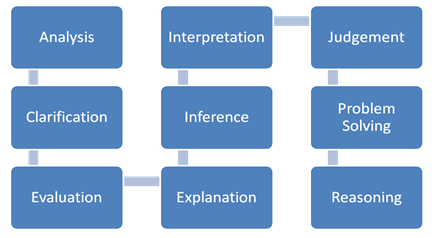One of the prerequisites for effective project management is critical thinking and systems thinking so as to manage the project on holistic basis and be judgmental in decision making.
Systems Thinking
Systems’ thinking has its foundation in the field of system dynamics, founded by MIT professor Jay Forrester in 1956. Systems thinking allows people to make their understanding of social systems explicit and improve them in the same way that people can use engineering principles to make explicit and improve their understanding of mechanical systems.
Systems thinking are fundamentally different from that of traditional forms of analysis. Where, traditional analysis focuses on the separating the individual pieces of what is being studied where systems thinking, in contrast, focuses on how the thing being studied interacts with the other constituents of the system—a set of elements that interact to produce behavior—of which it is a part.
Systems thinking involve expanding its view to take into account larger and larger numbers of interactions as an issue is being studied. This leads sometimes in a remarkably different conclusions than those generated by traditional forms of analysis, especially when what is being studied is dynamically complex or has a great deal of feedback from other sources, internal or external.
Applicability of Systems Thinking
Complex problems involving helping many factors and analyzing the “big picture” and not just their part of it
Recurring problems or those that have been made worse by past attempts to fix them
Issues where an action affects (or is affected by) the environment surrounding the issue, either the natural environment or the competitive environment
Problems whose solutions are not obvious
System thinking in Project Management is applicable such that the project manager begins to think in terms of a whole system that is he views not only the job to be done but also the manner in which organizational disciplines can be maintained related to the project.
Project managers should not only think about the goals of the project, but should also think about how the finished product meets customer needs, how it satisfies corporate goals, how it compares to competitive products, and it might be managed so that it motivates co-workers. Under this broader perspective of systems thinking project the managers must also be sensitive to interactions between the organizational disciplines, the political aspects, and the cultural aspects of the project environment.
Critical Thinking
Critical thinking is a kind of thinking may be about any subject, content, or problem such that the thinker tries to improve the quality of their thinking by skillfully taking charge of the structures inherent in thinking and imposing intellectual standards upon them.
Shoddy thinking does not only costs in terms of money but also deteriorates quality of life. Excellence in thought, however, must be systematically cultivated.
Requirements in Critical Thinking
Raise vital questions and problems, formulating them clearly and precisely;
Gathers and assesses relevant information, using abstract ideas to interpret it effectively
Thinks open-mindedly within alternative systems of thought, recognizing and assessing, as need be Communicating effectively with others in figuring out solutions to complex problems.
Critical thinking is primarily a self-directed, self-disciplined, self-monitored, and self-corrective thinking. It involves effective communication and problem solving abilities and a commitment to overcome our native egocentrism and sociocentrism.
Critical thinking enables to deduce consequences from what is known, and then making use of information to solve problems, and to seek relevant sources of information. Although critical thinking skills can be used in exposing fallacies and bad reasoning, critical thinking can also play an important role in cooperative reasoning and constructive tasks.
Critical Thinking Skills


